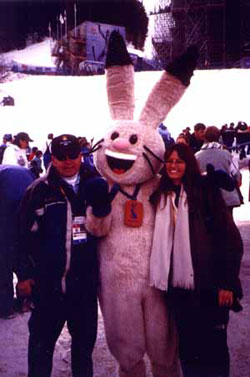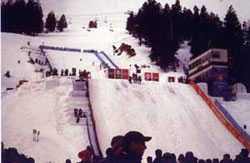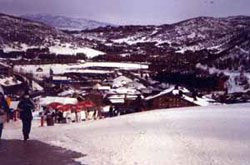Breakfast (Lunch and Dinner) of Champions
When balancing work, school and a family, cooking dinner can seem impossible. Imagine preparing 125,000 meals each day on top of a mountain that is 8 to 10,000 feet above sea level where there are no kitchens, no supermarkets and no roads leading to the top.
That's exactly what TC Doctoral Student in Adult and Organizational Learning John Avella did over his winter break. He worked with about 4,000 people to prepare all the meals that fed staff, volunteers, athletes, guests, and sponsors at the 2002 Olympics in Salt Lake City, Utah.
"It's the world's stage," said Avella who was Human Resources Director for Compass Group/Restaurant Associates, the company that did all the food service in the Olympic Village and at each of the venues. "The stress and pressure is unbelievable. You have all the athletes, who are heroes of their countries and you are meeting kings and other European royalty."
This was the first time that one food service company managed all the food for the whole Olympics. This included the Olympic Village, where the athletes lived, and each of the venues where the events were held.
Getting the food, tents and supplies up to the top of the mountain was a big challenge. There were no roads, equipment or food service facilities up there. So, Avella and his staff had to bring everything up by a toboggan or by a snow mobile. Each day, fresh food was brought up the mountain.
In addition to feeding athletes, families and guests, Avella also fed the national guard-an additional 16,000 meals-in four different locations. They ate four to five meals a day due to their shifts.
Three times a day, FDA and local health inspectors came to inspect the tents where food was being prepared and served. The Olympic Village was inspected every hour.
"We can't let an athlete get food poisoning," said Avella. "If that happens, all those years of training are over."
Avella said that they kept the menus simple at the places where the events were held. Those menus included sandwiches and chicken noodle soup. The biggest seller for athletes was the broiled steak.
Setting up the facilities to cook and serve the food was equally difficult. Avella said that there were four to five different tents for athletes, family, sponsors, and staff. From hotdogs to three-course meals, chefs from around the world prepared the meals.
Training and keeping volunteers and staff became a problem. Turnover was high. Extensive background checks of 10 to 20 years were required for employment. So, Avella had to have other certified people on hand to replace the ones that left. He accredited 4,000 people for 800 jobs, and by the end of the Olympics he employed all of them.
The people who worked at the Olympics were trained to be sensitive to people of other cultures. They were instructed to not use hand gestures that could offend people of other countries. Avella considered all aspects of preparing and serving food to a large multicultural group.
"This was the hardest thing I've ever done," said Avella who was Vice President of Marriott Corporation, Rainbow Room and Windows on the World. Currently he teaches graduate courses in Hotel and Restaurant Management at Fairleigh Dickinson University.
During the opening ceremony, Avella said that the secret service went crazy when President Bush appeared and sat with the athletes. The ceremony was especially personal for Avella when the flag from the World Trade Center arrived, since he worked at Windows on the World and he knew many of the people who lost their lives there.
After working for two months straight at the Olympics from 6 am to 8 pm, Avella came back to New York City. Although he's had some offers to manage other big events around the country, Avella is concentrating on his projects for school and teaching his classes for now.
Published Sunday, May. 19, 2002


